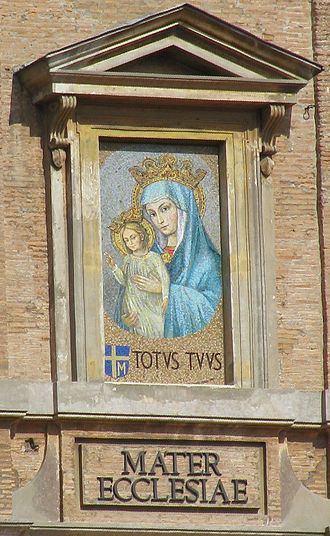We celebrate today the memorial of Mary, Mother of the Church, as mentioned, made official by Pope Paul VI in 1964. During the Council, there was debate whether to have a separate document on Our Lady, but the decision was made by the Fathers (by a narrow margin, to be sure, of forty votes, one of the closest) to place the Mariological teaching at the end of the Dogmatic Constitution of the Church, Lumen Gentium, since not only was Mary’s life totally given to Christ, the nascent Church and the first believers, but she herself is the very type and perfection of all the Church is meant to be: To form believers in the fullness of charity, grace and truth. As the decree instituting this memorial teaches:
This celebration will help us to remember that growth in the Christian life must be anchored to the Mystery of the Cross, to the oblation of Christ in the Eucharistic Banquet and to the Mother of the Redeemer and Mother of the Redeemed, the Virgin who makes her offering to God.
So today, especially, invoke the tender Mother of God, of Christ and of the Church, that all men of good will may respond to the truth, and that they may at least be united to Christ by grace and charity, moving towards that fullness of union in the one, holy, Catholic and apostolic Church, under the maternity of the humble handmaid, whom God has exalted above all.
As the first day after Pentecost, we also on today enter back into the less-than-felicitously named ‘Ordinary Time’, for no time in God’s kingdom is ‘ordinary’ in our now common sense of that term.
As far as I know, the term ‘ordinary’ here derives not from our English use of the term – the contrary of ‘extra-ordinary’ – but rather from the custom of counting the Sundays in ‘ordinal’ numbers, from the ‘First Sunday in Ordinary Time’, which is the feast of the Lord’s Baptism just after Christmas, to the 33rd Sunday, after which we close off the liturgical year with the solemnity of Christ the King. Between the Sundays, there are the ‘ferial’ days, regular weekdays in English, but which Latin term ironically derives from festum or feast, that is, from the festive Sunday from which they follow.
So, if you have followed all of this, we are now in the Ninth Week in ‘ordinary’ time, which puts us in the second week of psalter, in that ongoing song of the Church’s praise, with which we hope to meet the Lord upon His return, at the end of time, which will, I would imagine, indeed be most extra-ordinary.

